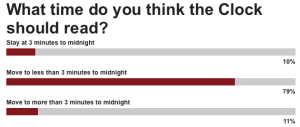Peter Lobner
This year is the 70th anniversary of the Doomsday Clock, which the Bulletin of the Atomic Scientists describes as follows:
“The Doomsday Clock is a design that warns the public about how close we are to destroying our world with dangerous technologies of our own making. It is a metaphor, a reminder of the perils we must address if we are to survive on the planet.”
You’ll find an overview on the Doomsday Clock here:
http://thebulletin.org/overview
The Clock was last changed in 2015 from five to three minutes to midnight. In January 2016, the Doomsday Clock’s minute hand did not change.
On 26 January 2017, the Bulletin of the Atomic Scientists Science and Security Board, in consultation with its Board of Sponsors, which includes 15 Nobel Laureates, decided to reset the Doomsday Clock to 2-1/2 minutes to midnight. This is the closest it has been to midnight in 64 years, since the early days of above ground nuclear device testing.
The Science and Security Board warned:
“In 2017, we find the danger to be even greater (than in 2015 and 2016), the need for action more urgent. It is two and a half minutes to midnight, the Clock is ticking, global danger looms. Wise public officials should act immediately, guiding humanity away from the brink. If they do not, wise citizens must step forward and lead the way.”
You can read the Science and Security Board’s complete statement at the following link:
http://thebulletin.org/sites/default/files/Final%202017%20Clock%20Statement.pdf
Their rationale for resetting the clock is not based on a single issue, but rather, the aggregate effects of the following issues, as described in their statement:
A dangerous nuclear situation on multiple fronts
- Stockpile modernization by current nuclear powers, particularly the U.S. and Russia, has the potential to grow rather than reduce worldwide nuclear arsenals
- Stagnation in nuclear arms control
- Continuing tensions between nuclear-armed India and Pakistan
- North Korea’s continuing nuclear development
- The Iran nuclear deal has been successful in accomplishing its goals in its first year, but its future is in doubt under the new U.S. administration
- Careless rhetoric about nuclear weapons is destabilizing; for example, the U.S. administration’s suggestion that South Korea and Japan acquire their own nuclear weapons to counter North Korea
The clear need for climate action
- The Paris Agreement went into effect in 2016
- Continued warming of the world was measured in 2016
- S. administration needs to make a clear, unequivocal statement that it accepts climate change, caused by human activity, as a scientific reality
Nuclear power: An option worth careful consideration
- Nuclear power a tempting part of the solution to the climate change problem
- The scale of new nuclear power plant construction does not match the need for clean energy
- In the short to medium term, governments should discourage the premature closure of existing reactors that are safe and economically viable
- In the longer term, deploy new types of reactors that can be built quickly and are at least as safe as the commercial nuclear plants now operating
- Deal responsibly with safety issues and with the commercial nuclear waste problem
Potential threats from emerging technologies
- Technology continues to outpace humanity’s capacity to control it
- Cyber attacks can undermining belief in representative government and thereby endangering humanity as a whole
- Autonomous machine systems open up a new set of risks that require thoughtful management
- Advances in synthetic biology, including the Crispr gene-editing tool, have great positive potential, but also can be misused to create bioweapons and other dangerous manipulations of genetic material
- Potentially existential threats posed by a host of rapidly emerging technologies need to be monitored, and to the extent possible anticipated and managed.
Reducing risk: Expert advice
- The Board is extremely concerned about the willingness of governments around the world— including the incoming U.S. administration—to ignore or discount sound science and considered expertise during their decision-making processes
Prior to the formal decision on the 2017 setting of the Doomsday Clock, the Bulletin took a poll to determine public sentiment on what the setting should be. Here are the results of this public pole.
How would you have voted?

